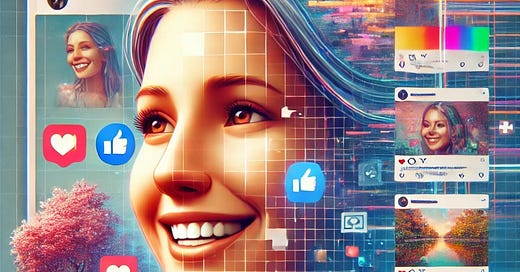The Authenticity Illusion: Why We Need to Rethink What's Real
The blurred lines between human and machine
Welcome to The Paid Media Mix, where I dive into the exciting world of AI-powered paid media. Usually, I'm all about the latest developments in digital advertising, but today I'm taking a step back to explore a more fundamental question: what does it mean to be authentic in a world where everything is curated? Join me on this thought-provoking journey, and if you like what you read, consider subscribing for more innovative insights.
Lately, I've been hearing a lot about authenticity - whether in social media, video content, or ad writing. Everyone seems to have strong opinions on what makes something "real" and how AI-generated content fits into that equation. But the more I listen, the more I realize that our perception of authenticity is nothing more than an illusion. We're living in a world where even the most seemingly honest posts are crafted to garner likes, shares, and comments. Influencers carefully curate their online personas, sharing only the most flattering, attention-grabbing moments of their lives. Politicians use speechwriters to craft their messages, and celebrities employ ghostwriters to pen their social media posts. Even our own social media updates are often shaped to fit a specific image or persona. So, what does it even mean to be authentic anymore?
We live in a world where many human interactions feel scripted - so why is AI-generated content seen as less real than human-created content that's strategically optimized for performance? The irony is that AI is designed to sound authentic. It mirrors the data it's trained on, the instructions it's given, and the voice of the person guiding it. When I use AI in my work, I'm not asking it to create something out of thin air - I'm giving it my insights, my strategic thinking, and my professional expertise. The output is shaped by me, even if the tool helps me refine and scale my ideas.
This raises a key question: If AI is trained on my expertise and shaped by my personal tone, doesn't that make it an extension of my authenticity rather than a threat to it? We're already living in a world where many human interactions feel scripted - so why is AI-generated content seen as less real than human-created content that's strategically optimized for performance?
As AI continues to evolve, we need to rethink our definition of authenticity. Instead of drawing a hard line between "human" and "machine," we should consider how AI can amplify human expertise rather than replace it. The content I create using AI is still mine - it reflects my years of industry experience, my strategic thinking, and my distinct way of communicating.
AI isn't stripping away my authenticity; it's giving me a new way to express it.
By embracing this new reality, we can focus on creating content that’s not only authentic but also effective, efficient, and engaging. We can use AI to amplify our voices, reach new audiences, and drive real results.
We can shatter the illusion of authenticity and reveal the truth: that authenticity is not about being human or machine, but about being genuine, relatable, and impactful.
Ready to Optimize?
The Paid Media Mix is a brand-new reader-supported publication designed to deliver exclusive, detailed tips you won’t find anywhere else—unless you hire a high-paid ad agency. As we grow, you can expect actionable insights and proven strategies to elevate your paid media campaigns.
Consider subscribing for free or becoming a paid member to unlock this growing library of insider knowledge and stay ahead in the ever-evolving world of digital advertising.






Even before AI, authenticity was in some sense degraded by noise of social media.
We pretend to be the authors of our own discourse, but in reality our discourse is a blend of numerous streams of competing versions of authenticity. Even when we feel we're being authentic, at best, perhaps we're simply being 'honest', which is not quite the same thing.
At some point in the future, AI may be an autonomous entity, but for now at least Ai is made from what we teach it. It is a reflection of us.
AI can be used to make us seem more authentic. It can also be used to bend the truth. There may come a time - if it hasn't already arrived - when we just learn to accept that we live in parallel worlds with different, incompatible truths. And where those truths are seen to intersect is where we will make 'a deal' before returning to our stream of perceived truth and reality.